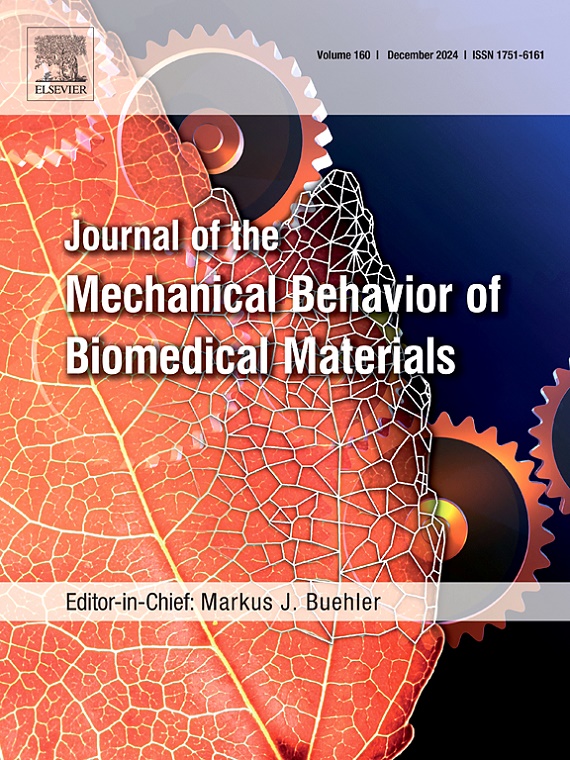Temporal evolution of mechanical properties in PDMS: A comparative study of elastic modulus and relaxation time for storage in air and aqueous environment
IF 3.3
2区 医学
Q2 ENGINEERING, BIOMEDICAL
Journal of the Mechanical Behavior of Biomedical Materials
Pub Date : 2024-10-12
DOI:10.1016/j.jmbbm.2024.106779
引用次数: 0
Abstract
Polydimethylsiloxane (PDMS) is a soft, biocompatible polymer extensively employed in biomedical research, notable for its tunable mechanical properties achieved through cross-linking. While many studies have assessed the mechanical properties of PDMS utilizing macroscopic and microscopic methods, these analyses are often limited to freshly prepared samples. However, the mechanical properties of PDMS can be expected to change during prolonged exposure to water or air, such as interface polymer chain loosening or surface hardening, which are critical considerations in applications like cell culture platforms or microfluidic devices. This paper presents a comprehensive 10-day investigation of the evolution of PDMS surface mechanical properties through AFM-based nano-indentation. We focused on the most commonly utilized crosslinker-to-base ratios of PDMS, 1:10 (r10) and 1:20 (r20), under conditions of air and deionized water storage. For r10 samples, a hardening process was detected, peaking at 2.12 ± 0.35 MPa within five days for those stored in air and 1.71 ± 0.16 MPa by the third day for those immersed in water. During indentation, the samples displayed multiple contact points, suggesting the formation of distinct regions with varying mechanical properties. In contrast, r20 samples exhibited better stability, with an observed elastic modulus averaging 0.62 ± 0.06 MPa for air-stored and 0.74 ± 0.06 MPa for water-stored samples. Relaxation experiments, interpreted via the General Maxwell Model featuring two distinct component responses, a relatively consistent fast response τ1 (on the order of 10−1 s), and a more variable, slower response τ2 (on the order of 10 s), throughout the study period. The identification of two distinct relaxation times suggests the involvement of two disparate material property regimes in the relaxation process, implying changes in the surface material composition at the interface with air/water. These variations in mechanical properties could significantly influence the long-term functionality of PDMS in various biomedical applications.
PDMS 机械特性的时间演变:空气和水环境中储存的弹性模量和弛豫时间比较研究
聚二甲基硅氧烷(PDMS)是一种柔软、生物相容性好的聚合物,广泛应用于生物医学研究,其显著特点是通过交联实现可调的机械特性。虽然许多研究利用宏观和微观方法评估了 PDMS 的机械特性,但这些分析通常仅限于新鲜制备的样品。然而,PDMS 的机械性能预计会在长期暴露于水或空气中的过程中发生变化,如界面聚合物链松动或表面硬化,这些都是细胞培养平台或微流控设备等应用中需要考虑的关键因素。本文通过基于原子力显微镜的纳米压痕技术,对 PDMS 表面机械性能的演变进行了为期 10 天的全面研究。在空气和去离子水储存条件下,我们重点研究了最常用的 PDMS 交联剂与碱的比例:1:10(r10)和 1:20(r20)。对于 r10 样品,检测到了硬化过程,在空气中储存的样品在五天内达到 2.12 ± 0.35 兆帕的峰值,而浸泡在水中的样品在第三天达到 1.71 ± 0.16 兆帕的峰值。在压痕过程中,样品显示出多个接触点,表明形成了具有不同机械性能的不同区域。相比之下,r20 样品表现出更好的稳定性,观察到的弹性模量平均为 0.62 ± 0.06 MPa(空气储存)和 0.74 ± 0.06 MPa(水储存)。松弛实验通过一般麦克斯韦模型进行解释,在整个研究期间有两种不同的成分反应,一种是相对一致的快速反应τ1(10-1 秒数量级),另一种是变化较大的慢速反应τ2(10 秒数量级)。两种截然不同的松弛时间的确定表明松弛过程涉及两种不同的材料特性状态,这意味着与空气/水交界处的表面材料成分发生了变化。这些机械性能的变化可能会极大地影响 PDMS 在各种生物医学应用中的长期功能。
本文章由计算机程序翻译,如有差异,请以英文原文为准。
求助全文
约1分钟内获得全文
求助全文
来源期刊

Journal of the Mechanical Behavior of Biomedical Materials
工程技术-材料科学:生物材料
CiteScore
7.20
自引率
7.70%
发文量
505
审稿时长
46 days
期刊介绍:
The Journal of the Mechanical Behavior of Biomedical Materials is concerned with the mechanical deformation, damage and failure under applied forces, of biological material (at the tissue, cellular and molecular levels) and of biomaterials, i.e. those materials which are designed to mimic or replace biological materials.
The primary focus of the journal is the synthesis of materials science, biology, and medical and dental science. Reports of fundamental scientific investigations are welcome, as are articles concerned with the practical application of materials in medical devices. Both experimental and theoretical work is of interest; theoretical papers will normally include comparison of predictions with experimental data, though we recognize that this may not always be appropriate. The journal also publishes technical notes concerned with emerging experimental or theoretical techniques, letters to the editor and, by invitation, review articles and papers describing existing techniques for the benefit of an interdisciplinary readership.
 求助内容:
求助内容: 应助结果提醒方式:
应助结果提醒方式:


